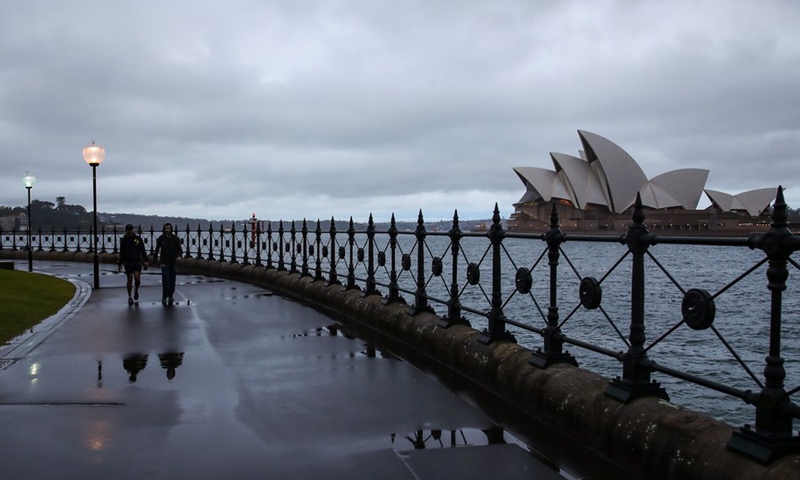China condemns Aussie’s HK-related moves as interference in internal affairs
By Xu Keyue Source: Global Times Published: 2020/7/9 18:28:40 Last Updated: 2020/7/10 16:38:36

People walk near the Sydney Opera House in Sydney, Australia, on June 10, 2020. (Xinhua/Bai Xuefei)
China deplores and opposes the groundless accusations made by the Australian government on Hong Kong issue, calling it a violation of international law and basic norms governing international relations and gross interference in China's internal affairs.
Following Canada, Australia has suspended its extradition agreement with China's Hong Kong Special Administration Region (HKSAR) and will offer visa extensions and a pathway to permanent residence to Hongkongers in Australia.
China strongly deplores and opposes the groundless accusations and measures announced by the Australian government with regard to Hong Kong, which is a serious violation of international law and basic norms governing international relations, and gross interference in China's internal affairs, the Chinese Embassy in Australia said on its official website.
Hong Kong affairs are China's internal affairs, the embassy said, accusing Australia's hypocrisy and double standards. "The Australian side has been clanking that they oppose 'foreign interference.' However, they have blatantly interfered in China's internal affairs by making irresponsible remarks on Hong Kong related issues," said the embassy.
The embassy urged the Australian side to immediately stop meddling in Hong Kong affairs and China's internal affairs under any pretext or in any way, as this would be "lifting a rock only to hit its own feet."
"The Chinese side does not buy such tricks. We strongly condemn it and reserve the right to make a further response. All the consequences arising there from will be borne entirely by the Australian side," China's Foreign Ministry spokesperson Zhao Lijian said on Thursday at a press conference.
Zhao stressed that any attempt to pressure China will never succeed and urged the Australian side to stop the moves so as to avoid further damage to China-Australia relations.
The Chinese Embassy in Australia said the national security law for Hong Kong "will strengthen Hong Kong's legal framework, ensure social order, improve the business environment, contribute to Hong Kong's long-term prosperity and stability and the steady implementation of the 'one country, two systems' principle."
"It [the law] will not affect the legitimate rights and interests enjoyed by Hong Kong residents and foreign institutions and personnel in the HKSAR," said the embassy.
Australia also issued a travel advisory on Thursday, saying "Do not travel to Hong Kong" in response to China's newly-passed national security law for the HKSAR, according to the official website of Australia's Department of Foreign Affairs and Trade.
Under the law [China's national security law for Hong Kong], you could be deported or face possible transfer to Chinese mainland for prosecution under mainland law…You may be at increased risk of detention on vaguely defined national security grounds, said the travel alert.
The statement asserted that the full extent of the national security law for Hong Kong and how it will be applied is not yet clear, a claim that Chinese experts said is groundless.
The Morrison administration's recklessness in handling issues related to Hong Kong indicates Canberra's increasingly erratic China policy, said Chen Hong, director of the Australian Studies Center at the East China Normal University in Shanghai, told the Global Times on Thursday
"Time and again, the Liberal-National Coalition government has been provocative in wreaking more damage on the bilateral relationship, which could further deteriorate beyond repair," said Chen.
Morrison flagrantly tore up the extradition treaty with Hong Kong, and he tried to coax Hong Kong businesses to relocate to Australia, Chen said, noting that such shameless bait and enticement to alienate the residents in Hong Kong from the Chinese mainland are "serious challenges to China's sovereignty."
Morrison and his government must bear the responsibility for such outrages, Chen said.
Two days before the new travel alert to Hong Kong, the Australian government issued a new travel warning for the Chinese mainland, saying that Australians could face "arbitrary detention" if they go there.
Observers said the China-Australia relationship is currently at its lowest point in the past two decades.
Chen said it is no coincidence that Canberra also recently issued the unwarranted warnings for Australian travelers to China.
"This concerted malicious fear and smear campaign aims to stoke up hostility toward China among the general public, not only in Australia, but in Hong Kong as well," Chen said.
Since the law was enacted last week, Canada has suspended its extradition treaty, while the UK has offered citizenship options to Hong Kong residents, foreign media reported.
The countries are all members of the Five Eyes alliance, which also includes New Zealand and the US. "A series of concerted maneuvers of blatant interference have been conducted by the five countries in China's domestic affairs. It is a worrying sign that the intelligence communities of these countries have turned out to have enhanced power over their governments," Chen noted.
Australia's Department of Foreign Affairs and Trade said Chinese government authorities have detained foreigners because they were allegedly "endangering national security."
In June, the Chinese government issued a study warning and travel alert to Australia, as the country has seen a significant rising trend of racial discrimination and violence against Chinese and other Asian people due to the COVID-19 pandemic.
RELATED ARTICLES:
Posted in: HK/MACAO/TAIWAN